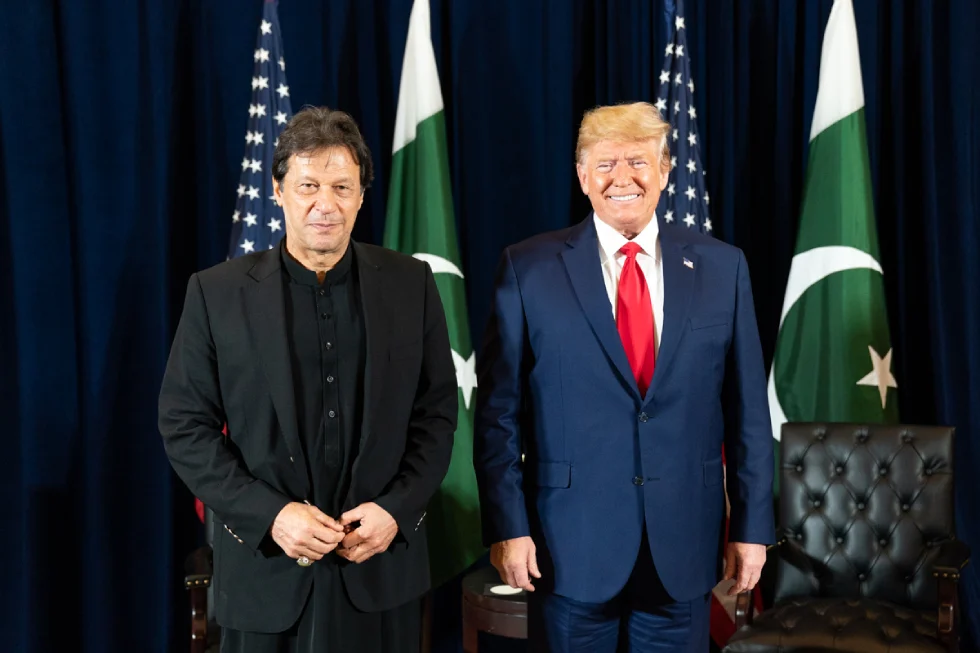Key Points
- Trump and Khan shared a unique bond during their respective tenures, rooted in populist ideals.
- US–Pakistan relations were strained under Trump initially but improved during Khan’s visit to Washington in 2019.
- Khan, now facing legal challenges, could potentially benefit from a Trump return, although geopolitical complexities with India present obstacles.
- Historically, US–Pakistan relations have been better under Republican administrations.
- The Pakistani diaspora is lobbying for US political support for Khan, with some success.
- A second Trump presidency could shift US foreign policy, but the outcome remains uncertain.

The Potential Impact of a Trump 2.0 Presidency on Imran Khan and US–Pakistan Relations
As the United States approaches a pivotal election, the prospect of Donald Trump returning to the White House is gaining traction. This raises important questions about how a second Trump administration could influence US–Pakistan relations and the political future of former Pakistani Prime Minister Imran Khan. Both populist leaders, Trump and Khan shared a distinctive rapport during their respective tenures. While Khan now faces imprisonment and legal challenges, Trump’s potential return could have significant implications for Pakistan and Khan’s political fate.
A Rocky Start and a Surprising Friendship
When Donald Trump began his first term in 2018, US–Pakistan relations were strained. In January of that year, Trump tweeted a scathing critique of Pakistan, accusing it of deceitfully accepting billions in US aid while allegedly harboring terrorists. The tweet sparked a diplomatic crisis, with Pakistan’s foreign ministry issuing a sharp rebuke, highlighting the fragile state of bilateral relations.
However, this discord began to shift in July 2019, when Pakistan’s newly elected Prime Minister Imran Khan visited Washington. In a striking turn of events, Trump extended a warm reception to Khan, marking a thaw in relations. The two leaders, both known for their celebrity status and disdain for political elites, appeared to connect on a personal level. Their shared populist ideals seemed to pave the way for a more cooperative dynamic between the US and Pakistan during Khan’s time in office.
Imran Khan’s Political Struggles
Khan’s political trajectory took a sharp downward turn in 2022 when he was ousted from office through a no-confidence vote in Pakistan’s parliament. Since then, he has faced a series of legal battles, including convictions, arrests, and acquittals, but remains in government custody. Despite his legal woes, Khan remains a significant figure in Pakistani politics, with a loyal base of supporters. His downfall, however, has coincided with a period of cooling US–Pakistan relations under the Biden administration.
The Biden administration’s response to Khan’s plight has been notably muted. Despite lobbying efforts from the Pakistani diaspora and US lawmakers, the White House has refrained from commenting on the political turmoil surrounding Khan. This silence has only fueled speculation that a Trump return could potentially revive Khan’s political fortunes.
Could Trump’s Return Revive US–Pakistan Relations?
Historically, US–Pakistan relations have often fared better under Republican administrations, which have tended to adopt a realpolitik approach to bilateral ties. The Cold War and the post-9/11 era are examples of how Republican presidents have sought strategic cooperation with Pakistan. A second Trump presidency could potentially follow this pattern, offering an opportunity for a reset in relations.
However, Trump’s foreign policy is highly transactional and unpredictable, making it difficult to forecast how his administration might approach Pakistan. On the one hand, Trump could see strategic value in rekindling ties with Islamabad, particularly in areas such as counterterrorism. On the other hand, the US’s growing partnership with India, aimed at counterbalancing China, remains a significant factor. This “India factor” could complicate any potential rapprochement with Pakistan under Trump, as Washington views India as a critical ally in the Indo-Pacific region.
The Role of the Pakistani Diaspora and US Lawmakers
The Pakistani diaspora in the US, many of whom support Imran Khan, has been actively lobbying Republican lawmakers to advocate for a more favorable US stance toward Pakistan. Should Trump return to power, this group may be instrumental in shaping policy discussions on Capitol Hill. Already, anecdotal evidence suggests that these efforts are gaining traction among influential Republican figures.
Uncertainty and Hope for Khan’s Political Future
While a Trump 2.0 presidency could offer a glimmer of hope for Imran Khan’s political rehabilitation, the broader geopolitical landscape makes any predictions highly speculative. The complexities of US–Pakistan relations, driven by Washington’s strategic ties with India and Trump’s unpredictable leadership style, create a cloud of uncertainty. Ultimately, Trump’s return may open the door for renewed diplomatic engagement, but the outcome for Khan and US–Pakistan relations remains far from certain.